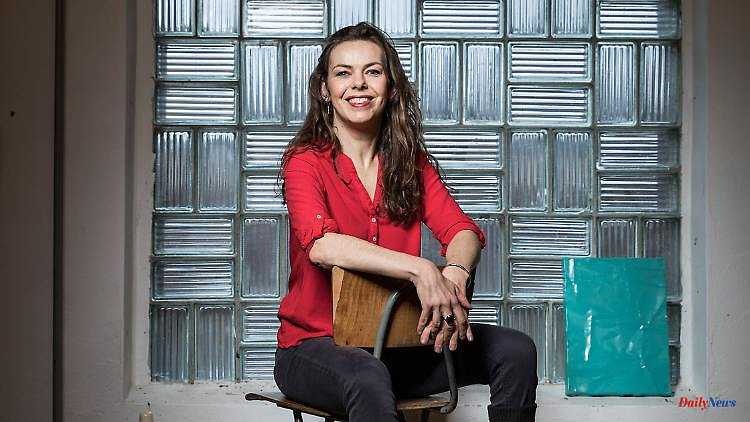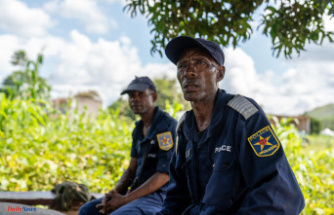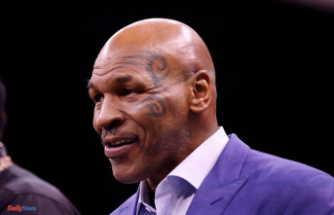Her third novel "Had I a Child" was published in March. It's about two girlfriends, a pregnancy and an adoption. And about Snow White. Or rather: the mother image in Grimm's fairy tales. And also about the question: Does a stepmother always have to be angry? The answer is - spoilers - yes it has to, well at least if the biological mother of a child wants to see it that way and if she wants her child to see it that way too. But leave that, Lea Streisand's story is much funnier, even if the topic is serious. ntv.de experiences a woman in an interview that you have to fall in love with on the spot. Lea Streisand has the perfect mix of "I want to be like her" and "I'll never be able to be like her". She is smart, attractive and funny. That's a lot, of course, because she's also successful, can be heard on the radio, is authentic and will soon also be a lecturer in poetry at the University of Paderborn. With a glass noodle between our front teeth - we're sitting with the Asian - we talk about the topic of Berliners, because that's - among other things - their trademark.
ntv.de: "Wessis shouldn't, Ossis had to live in Berlin, after all they were capital cities. Is that true?"
Lea Streisand: (laughs) I like dialects. They tell you something about you. I still remember with horror how a friend, when she had a crush on a man from Lower Saxony, started talking like him. She was, and I mean that lovingly, originally a real Kodderschnauze - and suddenly she speaks High German! I know Saxony and Thuringia, they were embarrassed by their dialect even before reunification, but coming from Berlin, sorry, that's a status symbol! For me anyway.
Is that part of the East German identity?
Even in the mid-1990s, we Berlin children didn't understand why everyone suddenly acted as if all Germans were Wessis. We weren't, and you could hear that. Besides, we didn't want to be replaced like things were the day after monetary union in 1990: You went back to your old "consumption" and all East products on the shelves were replaced by West products. Like being in the wrong movie. Melitta instead of Mokka-Fix, Bonduelle instead of Tempo lenses. My husband gets nervous when they rearrange two shelves in our Aldi. But that's how the nineties were: everything had to go. But we bohemian children from Prenzlauer Berg from academic and artistic families asked ourselves: "Why? We have our own history and our own identity." I always liked pioneer songs, I wanted to keep singing them (laughs). AND Christian songs AND the Beatles.
Language is something important, do you feel a kind of longing for other languages?
Living language changes. I am totally grateful that these English terms, for example in relation to identity politics, exist today! When I first read the word "gaslighting" I cried with relief. Because suddenly there was a word for what happened to me. And if they found a word for it, it means I'm not the only one this has happened to. Or "Ableism": I have a walking disability and I just can't do some things. And people have always said to me: "Come on Lea, pull yourself together, then it'll be fine." No, dude, it doesn't work! Different people have different needs and I am happy about every word that describes one of these differences and thus makes them visible.
New words are also part of creative writing...
I once gave seminars at the university, majoring in European literatures, which means there were a lot of international students. It was great to write stories with them, because very different storytelling cultures came together. A Brit just told it straight, classic storytelling. An Italian spoke so absurdly funny, it was like listening to the commedia de'll arte, and a Russian simply couldn't finish her sentences because she wanted to sound like Tolstoy. I don't care about the spelling mistakes at all. I'm interested in the stories. And spelling mistakes - they sometimes lead to wonderful new words.
Your book is also about fairy tales...
I know the reservations. But in the GDR it was the actors from the Deutsches Theater who spoke the fairy tales, they were wonderful radio plays, they were of a particularly high quality. It was like going to the theater. The Defa films were also quite enchanting. Not kitschy, pure, always with a little humor and irony. And what you shouldn't forget: In some places you could easily duck under the censors if you made children's literature or radio plays for children. Fairy tales were then rewritten, by Peter Brasch, for example, whose wolf was fed up with playing the bad guy because he preferred to go to the circus. So follow Little Red Riding Hood, because her fairy tale wouldn't work without a big bad wolf. As a child, I found that hilarious, even if I didn't understand what was being said between the lines.
But why this enthusiasm for Grimm's fairy tales, which weren't even written for children?
What I love about Grimm's fairy tales is that the fairy tales provide images for all the terrible beauty of our emotional world. Fairy tales do not judge: what happens, just happens. And that is exactly what childlike perception is. Only as adults do we judge, we interpret. Fairy tales are like trauma therapy – salvation is always included. When the wolf devours the kids, it gets dark, and when his belly is cut open so that the kids are free again, it gets light. Those are metaphors. The world is cruel, terrible things happen every day. But the way out is always part of the story.
Your novel is about mothers of all kinds...
Not every biological mother is the best mother for her child, even a stepmother can be a good mother, a father, a stepfather. Two and a half years of the pandemic are behind us, during which some of the children were simply left to their own devices. With the school and daycare closures, the state clearly acted with gross negligence. It has been proven that child abuse takes place in families, not at night in a dark park by an unknown perpetrator. It's your own parents, your mother's boyfriend, who gets abusive. But if all shelters for children are closed at the same time, there is no longer a corrective, no place to sound the alarm if something is weird. The children are simply no longer seen.
That's what fairy tales are about...
Yes, fairy tales are stories of abandoned children. You often wouldn't even be able to start if the child had great parents (laughs). So the child goes out into the world, all alone, and has adventures. It gets help from magical beings, strange people, helpful animals. And why are they helping? Because the child is so beautiful and so good. And because she's crying, the others react to that. The fairy tale tells the child nothing other than: You are great just the way you are. Sometimes terrible things happen and you feel like you're all alone, but there will always be others to help. It keeps going. That's very reassuring.
And the mothers from Prenzlauer Berg? Are they at least perfect?
(laughs) That's the mother as the personification of gentrification, like something out of a horror movie: a kind of female Godzilla with breasts and a baby bump, who is to blame for the housing shortage in Prenzlauer Berg through perpetual reproduction. A person who contaminates artists' pubs with their mother's milk, their big belly always in the way, the stroller anyway. The way mothers and their bodies have been talked about is shocking. Mothers should breastfeed and be quiet. According to the motto: "Now you have a child, what else do you want, now that's enough, what, you also want to say something, have an opinion, work, be loud? That's not possible." It's also terrible what a child-hostile society we live in. In other countries, for example in Denmark, more has arrived, who know that when the child is relaxed, for example in a restaurant, then the parents are relaxed too.
Children - having, having, loving, that's what your book is about...
It's really nobody's business whether I love my child or not. Some days parents even find their children stupid, unsympathetic. That's totally fine. What matters is that I am responsible for my child. These are the categories in which one can talk about children. Children are dependent, parents are in charge, love is not the subject to be discussed in society. It's an old rule that it takes a whole village to raise a child. This is not a private pleasure, but a social responsibility. Children are the future, they have to grow up stable. And that's tough because children are a risk of poverty for people. You really have to be able to afford children in Germany.
How much of you is in "If I had a child"?
I work strongly autofictional, that's the pool I draw from, but in the end it's always all smothered and a lie (laughs). Probably people who don't know me can read between my lines better than people who do know me. I tell stories, that's my job. I want to pump empathy out into the world, from all different perspectives. I want to focus on the people who are not the focus, for example people with disabilities. I would like to tell you about their everyday life.
Do you feel something like a compulsion to justify?
Which brings us back to ableism, because one of my most common phrases is, "I can't walk without my shoes, I have a walking disability." And I'm still asked, for example at a house warming ceremony, to take off my shoes inside or otherwise to go outside to the toilet across the construction site. This happens to people with disabilities all the time, just like any person who isn't part of the male, white, high-income elite, has to justify themselves whenever they point out their special needs. It sucks. A few years ago I wouldn't have said it like that. But I've had my disability since childhood, I've been justifying myself for it for as long as I can remember. But that's over now.
How are you going about this?
My whole life I've been listening to, "She could if she wanted to, she's just too lazy, she's getting in line." The bad thing is, I believed it. I literally put the shoe on. Now I have orthopedic shoes, before I had ready-made shoes. Because I didn't want to be disabled and I thought that if I just try, then I won't be disabled anymore. Because there's an industry that tells us we can mold ourselves to our will if we just try hard enough - and pay enough, of course. Now I'm in the middle of the emancipation process: I admit to myself that I sometimes need help, and anyone who's never been in this situation really can't imagine what it's like when people don't believe you.
Is that why you became a writer?
I think I became a writer because I've always had to explain a lot, because I've always had to tell something to get into other people's heads, for example into the heads of my family members (laughs). I also stand on stage, not because I'm such a stage pig, but because I'm never invisible anyway. I always wanted to be invisible - but you can't if you walk like me. For me, the safest place in the room is on stage. Nobody can knock me over there. And if everyone is staring at me anyway, then they can listen to me too. 'Cause I'm funny.
Does your closest environment think so too?
I'm wearing out friends right now. But I'm over forty now, I don't have to please everyone anymore. And if a friendship or relationship no longer works, then you can separate. It's a very liberating feeling.
You will also be confirmed in other areas, for example through your poetry lectureship ...
When the email came from the University of Paderborn, I had to pinch myself. I feel incredibly honored and very much looking forward to giving the five lectures. One of my topics will be: "Writing in the now." Means nothing other than saying something on stage, then making a tweet out of it and then posting a photo on Insta to finally record a podcast (laughs). If so goes very well, then one day the small core of the matter will become a thick novel.
What does writing mean to you?
It's a bit like being in love - but it's also horrifying when it becomes a novel: At the beginning there's still the idea, those are the butterflies in your stomach, nobody is allowed to know anything, and slowly you get closer, the novel and the writer . And on page 150 you know each other really well. The first 50 pages are always fun - the rest is work (laughs). There are also passages that you don't want to or can't tell because you're not ready yet. But the story grows as I write it, and I evolve with the book.
When is a text, a book, funny?
Whenever something is embarrassing. Writing means getting into the wound and then stirring it up properly. A brutal, painful act. Existential. Why am I doing it? I can't do anything else and one has to. Because there are still so many untold stories. By telling about my failure, by expressing the unspeakable, the imperfect is given a stage. And that's how we change the world.
Sabine Oelmann spoke to Lea Streisand












